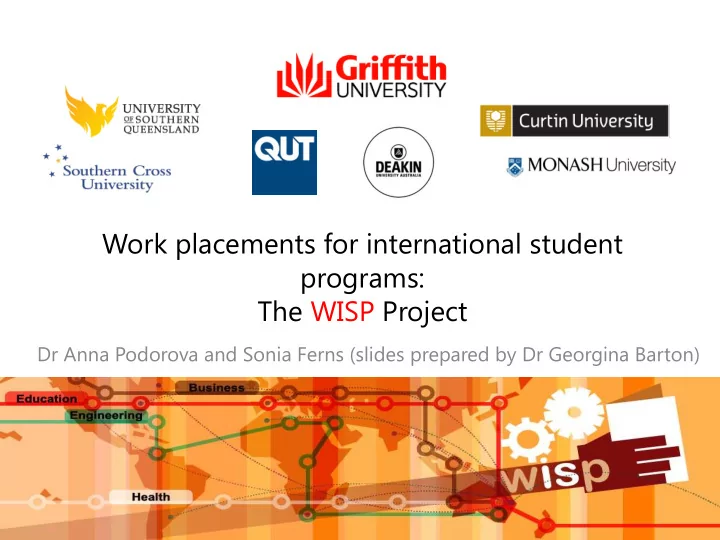

Work placements for international student programs: The WISP Project Dr Anna Podorova and Sonia Ferns (slides prepared by Dr Georgina Barton)
Overview • Work placements for international student programs – the WISP project • Office of Learning and Teaching Innovation Grant - August 2014-2016 • This project seeks to take a cross-disciplinary and contextual approach to improving work-placement (e.g. internship, practicum, clinical placement, work integrated learning) for international students, their mentors/supervisors and other people who support them
The WISP team Team Members Institution and Discipline Dr Georgina Barton and Dr Kay Hartwig Griffith University - Education Team leaders Associate Professor Liz Jones Griffith University - Psychology Dr Marleen Westerveld Griffith University – Speech Pathology Professor Marie Kavanagh USQ - Business Professor Marilyn Campbell, Dr Donna Tangen QUT - Education Ingrid Larkin QUT - Business Dr Erin O’Connor, Leith Harding QUT - Psychology Theresa Harvey QUT - Nursing Associate Professor Marilyn Chaseling Southern Cross University - Education Dr Dawn Joseph Deakin University - Education Dr Anna Podorova Monash University - Education Professor Dawn Bennett, Sonia Ferns Curtin University – Engineering and OT
The WISP support team Name Role Dr Melissa Cain Project Manager Dr Ann Kelly Independent Evaluator Jill Ryan Research Assistant Eric Wilson Research Assistant Natasha Berrell Research Assistant Tatjana Dordic Research Assistant Jill Bamforth (Deakin) Research Assistant Elsie Chipper (Curtin) Research Assistant Kathryn Garnier (Monash) Research Assistant Joy Reynolds Graphic Design and web and resource development
What we know • International students face different challenges in relation to work placement • Issues may include cultural, social and language differences, homesickness, limited resources, timing • Professional socialisation across disciplines will have different challenges for international students • Certain issues may arise unexpectedly in relation to workplace interactions and relationships • Some mentors/supervisors have stronger ‘cultural development’ than others • Students may not have been taught effective skills to reflect about professional practice
What the literature says • International students bring diversity and rich prior learning experiences to the workplace which can be drawn upon positively • Regular access to available support networks for international students can assist success i.e. cultural development awareness • Students on work-placement are best seen as having agency in the way they respond and learn while on the job • Workplace mentors are more confident and satisfied when they are supported and made more aware of issues facing international students • Critical reflection aids both students and workplace mentors in promoting agency and professionalism
What needs to be done • Enable international students to practise appropriate workplace skills, interactions and decision-making in supportive and constructive environments across disciplines • Construct a context whereby timely and focused responses and feedback are provided to international students to resolve workplace issues quickly and effectively • Equip both students and workplace mentors with skills for critical reflection
What we have said we would do Mentors/Supervisors: 1. To identify current procedures and those people who are practices in relation to work- responsible for placement and associated assessment assessing and working with students during for international students in the their placement discipline areas of Business, Education, Engineering, and Health in participating institutions Coordinators/Academics/ Support staff: 2. To identify challenges, concerns and those people responsible for the coordination of successes for international students , placements, at both their mentors and coordinators prior universities and to, during and after work placement workplaces
What we have said we would do • Develop a comprehensive website with supporting resources and materials, e.g., • Brochures for: » International students » Mentors/supervisors » Academic staff » University support staff • Disseminate information via multiple channels e.g. » ACEN Webinar – September 5 th » Forum in June 2016 www.wisp.org.au (currently under construction)
What we have said we would do 3. To develop a working model of effective practice around internationalisation , work-place socialisation and reflection . This model will be used in support materials for international students, their mentors, coordinators and relevant university staff
Internationalisation (Knight) Professional Reflection International socialisation (Ryan & Ryan) student (Billett) Cultural development Where we are aiming to (Wells) investigate
References Bain, J. D., Ballantyne, R., Mills, C., & Lester, N.C. (2002). Reflecting on practice: Student teachers’ perspectives. Flaxton: Post Pressed. Barton, G.M., Hartwig, K., & Cain, M. (2015/under review). International students’ experience of practicum in teacher education: An exploration through internationalisation and professional socialisation. Australian Journal of Teacher Education. Billett, S. (2004). Workplace participatory practices: Conceptualising workplaces as learning environments. Journal of Workplace Learning, 16(6), 312-324. Billett, S. (2009). Developing agentic professional through practice-based pedagogies. Office of Learning and Teaching Report. Knight, J. (1999). Internationalization of higher education. In J. Knight, & H. de Wit (Eds.), Quality and Internationalization in Higher Education, (pp. 13-23). Paris: OECD. Knight, J. (2004). Internationalization remodeled: Definition, approaches, and rationales. Journal of Studies in International Education, 8(1), 5-31 and Teaching Report, Lead Institution – Griffith University. Ryan, M., & Ryan, M. (2013). Theorising a model for teaching and assessing reflective learning in higher education. Higher Education Research & Development, 32(2), 244-257. Wells, M. (2000). Beyond cultural competence: A model for individual and institutional cultural development. Journal of Community Health Nursing, 17(4), 189 – 199.
Recommend
More recommend